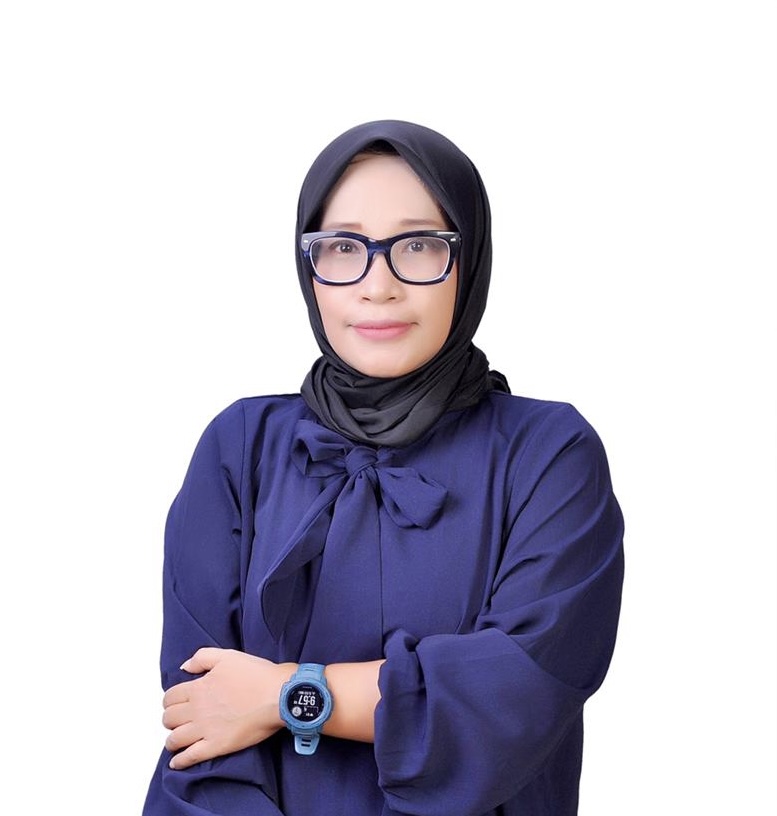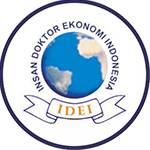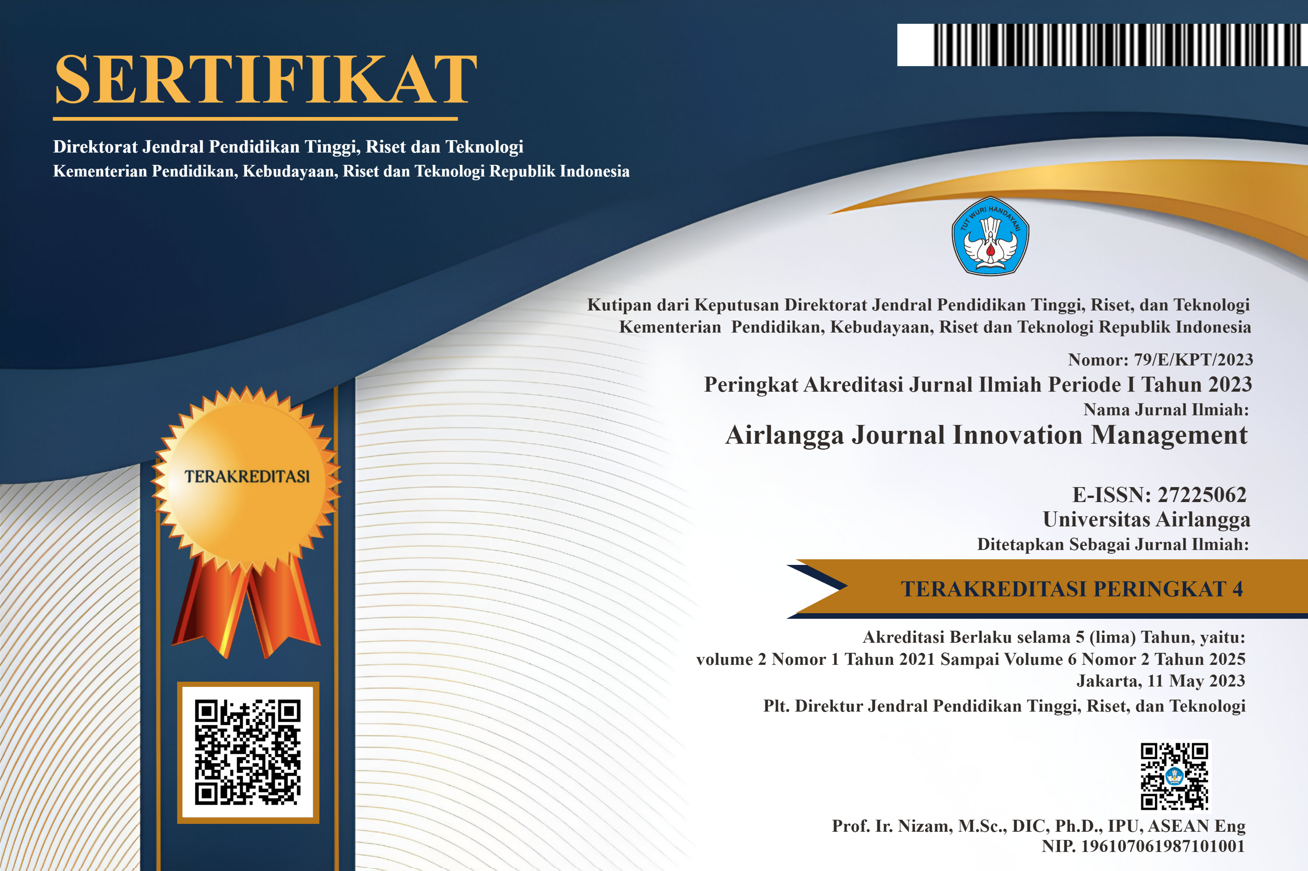FAKTOR-FAKTOR YANG MEMPENGARUHI NIAT WAKAF PRODUKTIF DALAM PEMBERDAYAAN PENYANDANG DISABILITAS
Unduhan
Penelitian ini bertujuan untuk menganalisis faktor-faktor yang mempengaruhi niat untuk memberikan wakaf produktif dalam rangka memberdayakan penyandang disabilitas. Penelitian ini menggunakan metode kuantitatif dengan data primer yang diperoleh melalui penyebaran kuesioner online kepada 60 responden. Hasil penelitian menunjukkan bahwa variabel persepsi dan media informasi memiliki pengaruh positif yang signifikan terhadap niat untuk memberikan wakaf produktif bagi pemberdayaan penyandang disabilitas. Sementara itu, variabel religiositas dan pendapatan memiliki pengaruh negatif terhadap niat untuk memberikan wakaf produktif bagi pemberdayaan penyandang disabilitas. Penelitian ini dapat digunakan sebagai referensi bagi pemerintah dan BWI untuk lebih mengintensifkan program pemberdayaan penyandang disabilitas. Hal ini akan memberikan dampak positif karena penyandang disabilitas akan mendapatkan keterampilan yang dapat digunakan untuk mendapatkan pekerjaan atau membuka usaha.
(ILO), I. L. O. (2013). Inklusi Penyandang Disabilitas di Indonesia.
Al Zaidi, S. M., Iyanna, S., Jabeen, F., & Mehmood, K. (2023). Understanding employees’ voluntary pro-environmental behavior in public organizations – an integrative theory approach. Social Responsibility Journal, 19(8), 1466–1489. https://doi.org/10.1108/SRJ-04-2022-0176
Aldeen, K. N., & Pertiwi, R. S. (2022). Cash waqf from the millennials ’ perspective : a case of Indonesia. https://doi.org/10.1108/IJIF-10-2020-0223
Badan Wakaf Indonesia. (2021). Knowledge Base Wakaf.
Badan Wakaf Indonesia. (2022). Indeks Wakaf Nasional 2022.
Badan Wakaf Indonesia. (2023). Pengembangan Wakaf Produktif.
Chaerunnisa, S. R., & Kasri, R. A. (2019). Indonesian muslim millennials’ intention to donate via online waqf: Theory of planned behavior approach. In Challenges of the Global Economy: Some Indonesian Issues (pp. 229–247).
Effendi, M. R. (2020). Development of Cash Waqf Benefits Synergy Foundation in the Economic Empowerment of the Ummat. Amwaluna: Jurnal Ekonomi Dan Keuangan Syariah, 5(1), 29–39. https://doi.org/10.29313/amwaluna.v5i1.6916
Fauzi, Q., Ulfah, U., & Wijayanti, I. (2024). Ethical challenges in transportation: A study on the implementation of Islamic business values. Al-Uqud: Journal of Islamic Economics, 8(2).
Ghifara, A. S., Iman, A. N., Wardhana, A. K., Rusgianto, S., & Ratnasari, R. T. (2022). The Effect of Economic Growth, Government Spending, and Human Development Index toward Inequality of Income Distribution in the Metropolitan Cities in Indonesia. Daengku: Journal of Humanities and Social Sciences Innovation, 2(4), 529–536.
Haidlir, B. M., Laksmono, B. S., Kasri, R. A., Azizon, A., & Hartono, D. (2021). Public Behaviour on Cash Waqf: Evidence from Indonesia. Jejak, 14(2), 316–332. https://doi.org/10.15294/jejak.v14i2.32032
Herianingrum, S., & Widiastuti, T. (2016). the Empowerment Model of Cash Waqf To Improve Education Quality in Zakat Institutions. International Journal of Islamic Business Ethics, 1(1), 53. https://doi.org/10.30659/ijibe.1.1.53-65
Iman, A. N., Sukmana, R., Ghifara, A. S., & Wardhana, A. K. (2022). The Effect of Zakat Collection, Company Age, and Company’s Total Assets on Financial Performance of Sharia Banking in Indonesia 2019-2020. Economic Education and Entrepreneurship Journal, 5(2), 217–224.
Iman, A. N., Wardhana, A. K., Rusgianto, S., & Ratnasari, R. T. (2022). Venture vs Investment, Which Type of Financing was more Demanded by Agriculture, Forestry, and Aquaculture Sector? Daengku: Journal of Humanities and Social Sciences Innovation, 2(5), 587–595.
Jatmiko, W., Haidlir, B. M., Azizon, A., Laksmono, B. S., & Kasri, R. (2023). Intergenerational analysis of cash waqf behavior: lessons learned from Indonesia. Journal of Islamic Accounting and Business Research. https://doi.org/10.1108/JIABR-03-2022-0086
Jihan, N. Z., & Asma’, M. (2022). Model Alternatif Wakaf Uang dalam Pemberdayaan Disabilitas (AWUPD). Al-Awqaf: Jurnal Wakaf Dan Ekonomi Islam, 15(1), 20–32. https://doi.org/10.47411/al-awqaf.vol15iss1.136
Kasdi, A. (2021). FIQIH WAKAF (Dari Wakaf Klasik Hingga Wakaf Produktif) (U. Farida (ed.)). Idea Press.
Kemenkes. (2014). Situasi Penyandang Disabilitas. Buletin Jendala Data Dan Informasi Kesehatan.
Laila, N., Ratnasari, R. T., Ismail, S., Mohd Hidzir, P. A., & Mahphoth, M. H. (2023). The intention of small and medium enterprises’ owners to participate in waqf: the case of Malaysia and Indonesia. International Journal of Islamic and Middle Eastern Finance and Management, 16(3), 429–447. https://doi.org/10.1108/IMEFM-01-2022-0014
Loestefani, V., Poan, R., Suwitorahardjo, B., & Wardhana, A. K. (2022). Service Quality and Product Quality as An Influence on Customer Loyalty at Naturalis Koffie. FIRM Journal of Management Studies, 7(2), 211–236.
LPEM UI. (2017). Laporan Akhir Memetakan Penyandang Disabilitas (PD) di Pasar Tenaga Kerja di Indonesia.
Mafruchati, M., Othman, N. H., & Wardhana, A. K. (2023). Analysis of the Impact of Heat Stress on Embryo Development of Broiler: A Literature Review. Pharmacognosy Journal, 15(5).
Mafruchati, M., Wardhana, A. K., & Ismail, W. I. W. (2022). Disease and viruses as negative factor prohibiting the growth of broiler chicken embryo as research topic trend: a bibliometric review. F1000Research, 11(1124), 1124.
Mendo, A. Y., Singh, S. K., Yantu, I., Hinelo, R., Bokingo, A. H., Dungga, E. F., Juanna, A., Wardhana, A. K., Niroula, B., & Win, T. (2023). Entrepreneurial leadership and global management of COVID-19: A bibliometric study. F1000Research, 12(31), 31.
Muhammad, I. N., & Mubarak, A. (2018). Islamic Financial Inclusion for Women Empowerment: Imperative for Establishing Cash Waqf for Preventing Rural-Urban Girl-Child Hawking in Kano, Nigeria. 33, 1–7.
Mundjito. (2012). Pendidikan Inklusif. Baduose Media.
Mundzir Qahaaf. (2005). Manajemen Wakaf Produktif. Khalifa.
Nasrudin, Endin, & Jaenudin, U. (2021). Psikologi Agama dan Spiritualitas. Lagood’s Publishing.
Nizar, M., Dzikrulloh, N. Q., & Ansori, R. (2019). Mosque Based Economic Empowerment Model to Overcome Poverty in Indonesia. CIFET 2019: Proceedings of the 1st Conference on Islamic Finance and Technology, CIFET, 21, 88.
Nuraini, I., Takidah, E., & Fauzi, A. (2018). Faktor-Faktor Yang Mempengaruhi Intensi Dalam Membayar Wakaf Uang Pada Pegawai Kantor Wilayah Kementerian Agama Provinsi Dki Jakarta. Jurnal Ekonomi Syariah Dan Bisnis, 1(http://jurnal.unma.ac.id/index.php/Mr/index), 97–108.
Oftafiana, T., & Siswahyudianto. (2023). The Effect of Religiosity, Perception, Income, and Media Access to Infor- mation on Public Waqf Intentions in Cash Waqf Linked Sukuk in City of Surabaya. 3(1), 1–20.
Oh, H. J., Lee, B., Ma, H. H., Jang, D., & Park, S. (2024). A preliminary study for developing perceived ESG scale to measure public perception toward organizations’ ESG performance. Public Relations Review, 50(1), 102398. https://doi.org/10.1016/j.pubrev.2023.102398
Pramudia, R. A., & Syarief, M. E. (2020). Pengaruh Persepsi Pengetahuan, Informasi, Dan Religiusitas Terhadap Minat Berwakaf Uang. Jurnal Justisia Ekonomika: Magister Hukum Ekonomi Syariah, 4(2). https://doi.org/10.30651/justeko.v4i2.6482
Pratiwi, A. C., Wardhana, A. K., & Rusgianto, S. (2022). Application of Vector Error Correction Model on Macroeconomic Variables toward Changes in the Composite Stock Price Index. Daengku: Journal of Humanities and Social Sciences Innovation, 2(2), 219–229.
Qosim, N., Ratnasari, R. T., Wardhana, A. K., Fauziana, H., & Barkah, T. T. (2023). Eight Years of Research Related to the Green Sukuk in the Global Stock Exchange Market to Support the Implementation of SDG: A Bibliometric Review. Journal of Islamic Economic and Business Research, 3(2), 161–180.
Rachma, A., & Mardiana, M. (2022). Pengaruh Pengetahuan, Religiusitas Dan Akses Media Informasi Terhadap Minat Berwakaf Sukuk Wakaf. Ekonomi, Keuangan, Investasi Dan Syariah (EKUITAS), 4(1), 22–27. https://doi.org/10.47065/ekuitas.v4i1.1663
Rahayu Hijrah Hati, S., & Idris, A. (2014). Antecedents of customers’ intention to support Islamic social enterprises in Indonesia. Asia Pacific Journal of Marketing and Logistics, 26(5), 707–737. https://doi.org/10.1108/APJML-08-2014-0126
Rahman, I., Ratnasari, R. T., & Wardhana, A. K. (2022). Effect of Certificate of Bank Indonesia Sharia and Indonesian Bank Seven Days Repository Rate to Inflation Ratio in Indonesia During Covid-19 Pandemic. Economic Education and Entrepreneurship Journal, 5(1), 157–174.
Reksoprayitno, S. (2004). Sistem Ekonomi Dan Demokrasi Ekonomi. Bina Grafika.
Ryandono, M. N. H., Kusuma, A., Maryani, A., & Wijayanti, I. (2022). Factors influence online donation during COVID-19 pandemic. Al-Uqud: Journal of Islamic Economics, 6(1), 66–83.
Ryandono, M. N. H., Mawardi, I., Rani, L. N., Widiastuti, T., Ratnasari, R. T., & Wardhana, A. K. (2022). Trends of research topics related to Halal meat as a commodity between Scopus and Web of Science: A systematic review. F1000Research, 11(1562), 1562.
Ryandono, M. N. H., Wijayanti, I., & Kusuma, K. A. (2020). Determinants of Investment In Islamic Crowdfunding. Muqtasid: Jurnal Ekonomi Dan Perbankan Syariah, 11(1), 70–87.
Santoso, T. B., & Kusuma, A. (2023). The Development of the Usage of Blockchain for Waqf and Zakat Globally: A Bibliometric Study. International Journal of Mechanical Computational and Manufacturing Research, 13(3), 83–91.
Sulistiani, S. L., Mulyadi, D., & Gumilar, A. S. (2021). Literasi Wakaf Melalui Media Sosial Untuk Meningkatkan Kesadaran Berwakaf ِ ِ. 7(03), 1551–1560.
Vika A . Qurrata, L. S. N. E. H. (2020). Media promotion , Islamic religiosity and Muslim community perception towards charitable giving of cash waqf. 13(3), 296–305.
Walgito, & Bimo. (2004). Pengantar Psikologi Umum.
Wardhana, A. K. (2021a). The Application of Waqf and Endowment Fund Based on the Principles in the Sharia Maqashid Pillar Society. Prosperity: Journal of Society and Empowerment, 1(2), 107–119. https://doi.org/10.21580/prosperity.2021.1.2.8829
Wardhana, A. K. (2021b). THE IMPACT OF THE PRO AND CONS POLICIES IN JOKOWI ERA’S ON THE MACRO ECONOMY OF SOCIETY. Jurnal Ekonomi Dan Bisnis Airlangga, 31(2), 124–136. https://doi.org/https://doi.org/10.20473/jeba.V31I22021.124-136
Wardhana, A. K. (2022). JANJI (WA’AD) SEBAGAI JARING PENGAMAN PADA TRANSAKSI KEUANGAN DAN BISNIS SYARIAH. Jurnal Keislaman, 5(1), 124–132. https://doi.org/https://doi.org/10.54298/jk.v5i1.3412
Wardhana, A. K. (2023). Applying Islamic Leadership In Working Environment: A Bibliometric Study. Journal Human Resources 24/7: Business Management, 1(1), 25–32.
Wardhana, A. K., & Ratnasari, R. T. (2022). Analisis sitasi publikasi tentang repositori bidang studi perpustakaan pada Web of Science selama pandemi. Daluang: Journal of Library and Information Science, 2(1), 53–61.
Wijayanti, I. (n.d.). Analisis Penerapan Qawaid Fiqiyyah Terhadap Kebijakan Belanja Pegawai Pemerintah Dalam Pelaksanaan APBN Di Indonesia. BOOK-5: EKONOMI ISLAM, 941.
Wijayanti, I., Herianingrum, S., & Ryandono, M. N. H. (2020). Islamic Crowdfunding Mechanism to Answer Renewable Energy Investment Challenge in Indonesia. Test Engineering and Management, 83, 3596–3605.
Wijayanti, I., Ryandono, M. N. H., & Petra, D. H. S. P. H. (2021). Financial Inclusion through Zakat Institution: Case Study in Indonesia and Brunei Darussalam. International Journal of Islamic Business and Economics (IJIBEC), 5(2), 128–140.
Yudha, A. T. R. C., Huda, N., Maksum, M., Sherawali, S., & Wijayanti, I. (2024). The Moderating Effect of Religiosity on Fashion Uniqueness and Consciousness in Halal Fashion Purchase. Indonesian Journal of Halal Research, 6(2), 71–84.
Zakik, Z., Kamil, A., Prasetyo, A. S., Ryandono, M. N. H., & Wijayanti, I. (2022). Economic development on Madura Island through halal tourism: A business feasibility study. Al-Uqud: Journal of Islamic Economics, 6(2), 289–303.
Zulaikha, S., Hendratmi, A., Sridadi, A. R., Basit, A., Iman, A. N., Wardhana, A. K., Ghifara, A. S., Pratiwi, A. C., Febriyanti, A. R., & Nugroho, A. D. (n.d.). FILSAFAT EKONOMI ISLAM Menjawab Tantangan Peradaban. Zifatama Jawara.
Hak Cipta (c) 2025 Airlangga Journal of Innovation Management

Artikel ini berlisensiCreative Commons Attribution-NonCommercial-ShareAlike 4.0 International License.
- The journal allows authors to hold copyright without restrictions and retain publication rights without restrictions. The author retains the copyright and grants the first publication rights to the journal, with his work simultaneously licensed under the Creative Commons Attribution-NonCommercial-ShareAlike 4.0 International License (CC BY-NC-SA). This license allows others to share the work with acknowledgment of authorship and initial publication in this journal, provided that the work is not used for commercial purposes and that any derivative works must use the same license.
- Authors may enter into additional contractual agreements for non-exclusive distribution of the journal publication version (e.g., uploading it to an institutional repository or publishing it in book form), while still including acknowledgment of the initial publication in this journal.
- Authors are allowed and encouraged to upload their work online (e.g., in an institutional repository or personal website) before and during the submission process. This can support productive scientific exchanges as well as increase citations to published works.

AJIM by UNAIR is licensed under a Creative Commons Attribution-NonCommercial-ShareAlike 4.0 International License.





















